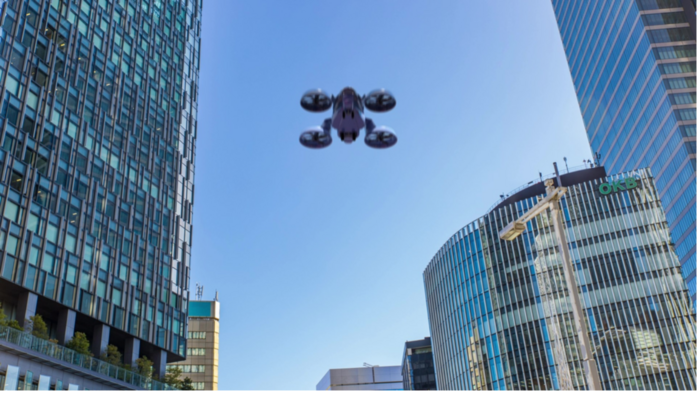Researchers from Nagoya University and Keio University in Japan have estimated a person’s stress levels caused by the sound of a flying car passing overhead. The research was published in the Technical Journal of Advanced Mobility in September 2022.

Credit: Dr Susumu Hara
Researchers from Nagoya University and Keio University in Japan have estimated a person’s stress levels caused by the sound of a flying car passing overhead. The research was published in the Technical Journal of Advanced Mobility in September 2022.
The drone market is booming, as several automobile companies and start-ups develop new personal aircraft. The long-awaited flying car, made famous in films like Blade Runner, may soon be a common sight in cities around the world. But while the automobile industry is busy developing technology to catch up to fantasy, few inventors or science fiction authors have thought much about how noise from the roaring and whirring of flying car engines might affect people’s psychological state. Professor Susumu Hara of the Department of Aerospace Engineering, Graduate School of Engineering at Nagoya University, the lead author of the study, points out that in past industrial revolutions, people often prioritized technological advancement and economic demands over social and environmental issues, including noise and air pollution. “Unless technology is well-integrated in our daily lives”, he argues, “we cannot expect it to make our society a better place”. Therefore, his team conducted an experiment to estimate people’s stress levels as if they were living in a world with flying cars.
In the research experiment, participants watched short videos that simulated cars flying in a city. The videos were designed so that the viewers felt like a car was flying 15 meters above them at a speed of 15.5 miles per hour (25 km per hour). To simulate such a scene, the videos used audio recordings of an industrial drone flying at a speed and height similar to the flying car depicted in the videos. Participants watched the video eight times, while the researchers changed the volume of the audio in each viewing to examine how the noise level would affect the participants. Participants’ stress levels were assessed using two different measures. First, while watching the videos, a portable EEG device, called a Kansei Analyzer, recorded their brain activity. Second, after watching each video, the participants responded to a written questionnaire.
The researchers found that each person’s self-reported stress level corresponded to the noise level of the flying car. As the noise increased, the participants reported greater stress. When the noise level decreased, they reported lower stress levels. However, brain activity data showed a different pattern. As predicted, when the noise level increased for the first time in the experiment, the EEG data showed higher levels of stress among the participants. But once the participants were exposed to loud noise, their stress levels did not decrease – even after the noise level dropped. This may suggest that while most people think they can become accustomed to loud noise, it may actually be causing them stress without noticing it. To protect the health of residents, it is important to consider the long-term effects of exposure to chronic loud traffic noise in a world where flying cars are constantly landing, taking off, and whizzing above us. In addition to a self-reported assessment, checking brain activity might also be necessary to measure stress from noise.
When considering flying cars, an obvious solution is for aerospace engineers to prioritize making them quieter. But for now, we do not know how to determine the optimal sound level for protecting citizens’ health. The researchers in this study hope that their measurement methods can help answer such questions.
“I am sure drones and flying cars will bring significant benefits to our society”, said Professor Hara. At the same time, the study clearly shows that we cannot neglect noise pollution. “We believe that developing guidelines and regulations on flying cars is important so that we can better adapt them to our lives”, he continued. “I hope this study provides some clues how to do that.”
DOI
10.34590/tjam.3.6_81
Article Title
Noise-Induced Stress Assessment ─On the Difference between Questionnaire-Based and EEG Measurement-Based Evaluations─




